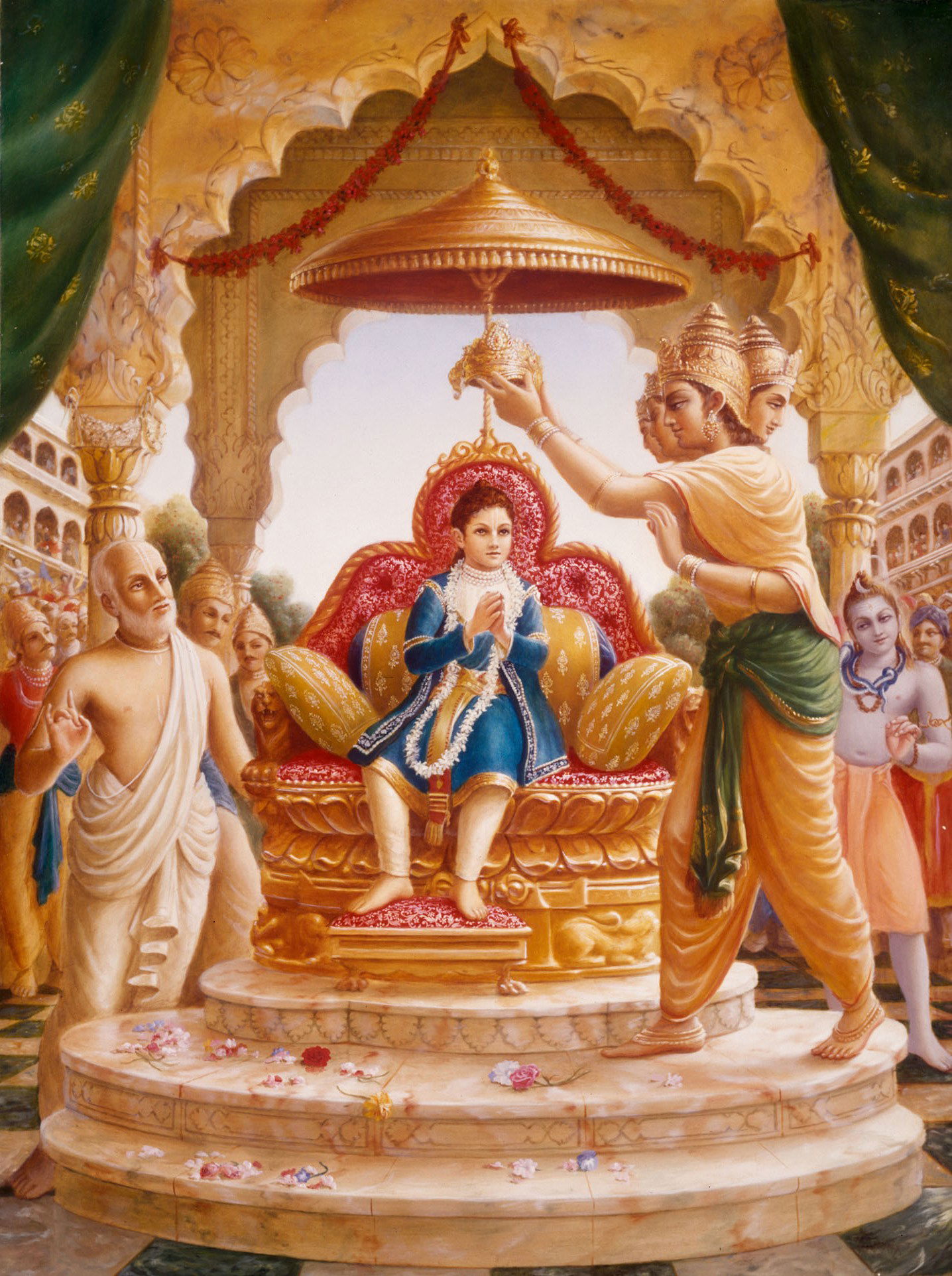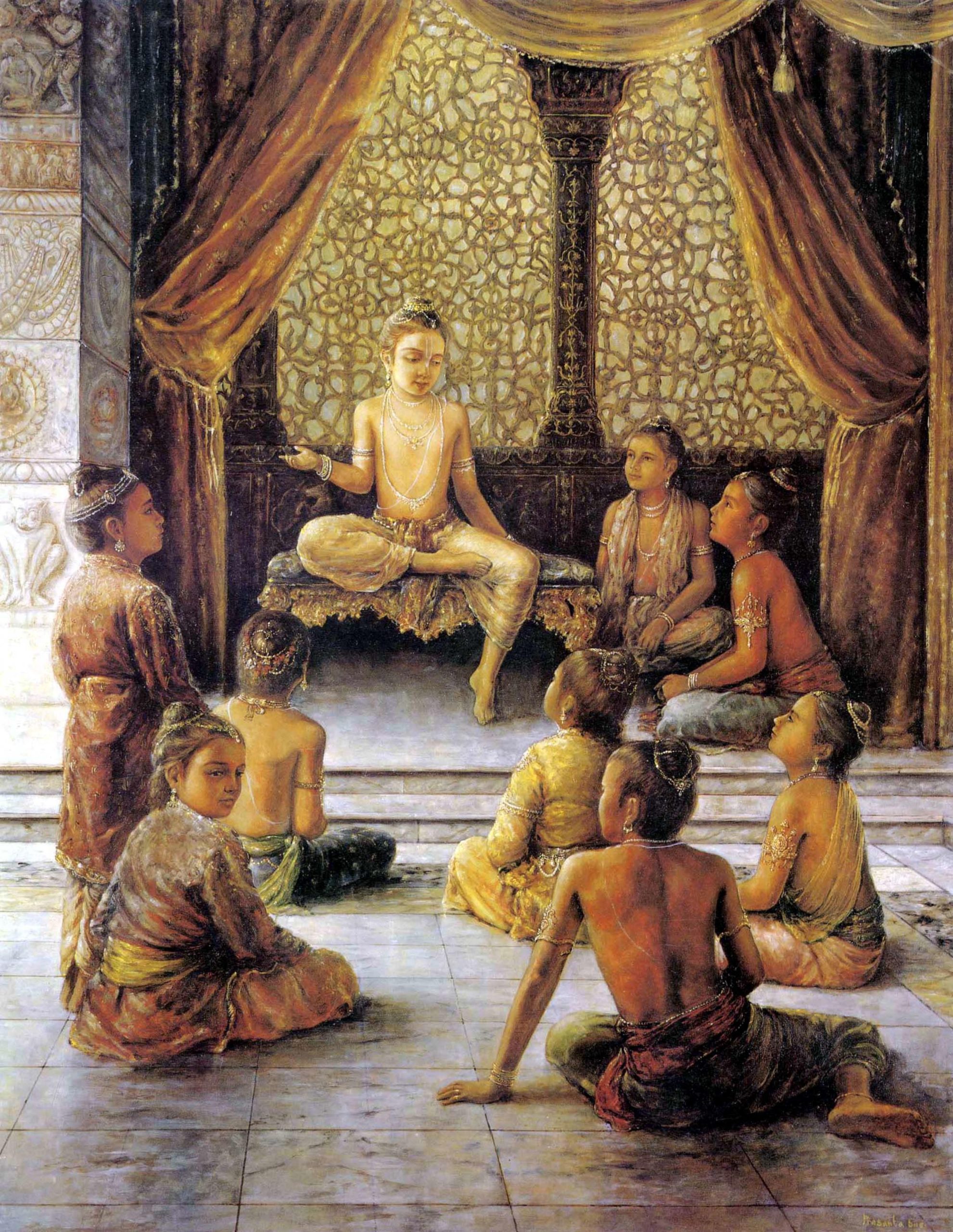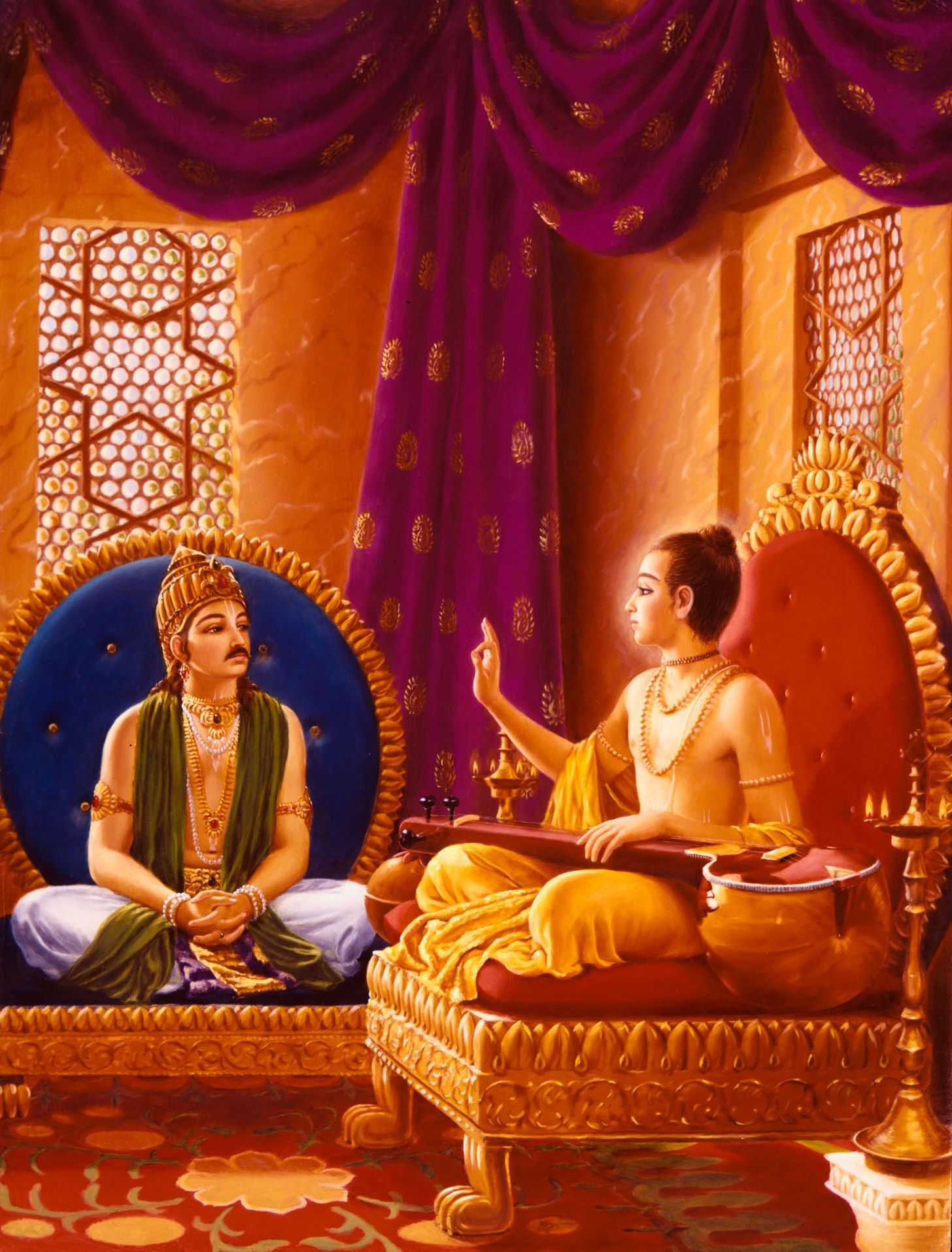Selected Verses From Srimad Bhagavatam Canto 7


When the Supreme Personality of Godhead creates different types of bodies, offering a particular body to each living entity according to his character and fruitive actions, the Lord revives all the qualities of material nature — sattva-guṇa (Mode of Goodness), rajo-guṇa (Mode of Passion) and tamo-guṇa (Mode of Ignorance).
Then, as the Supersoul, He enters each body and influences the qualities of creation, maintenance and annihilation, using Sattva for maintenance, Rajo-guṇa for creation and Tamo-guṇa for annihilation.
– Srimad Bhagavatam 7.1.10
Because of the bodily conception of life, the conditioned soul thinks that when the body is annihilated the living being is annihilated. Lord Vishnu, the Supreme Personality of Godhead, is the supreme controller, the Supersoul of all living entities.
Because He has no material body, He has no false conception of “I and mine.” It is therefore incorrect to think that He feels pleasure or pain when blasphemed or offered prayers. This is impossible for Him. Thus He has no enemy and no friend.
When He chastises the demons it is for their good, and when He accepts the prayers of the devotees it is for their good. He is affected neither by prayers nor by blasphemy.
– Srimad Bhagavatam 7.1.25
Therefore by enmity or by devotional service, by fear, by affection or by lusty desire — by all of these or any one of them — if a conditioned soul somehow or other concentrates his mind upon the Lord, the result is the same, for the Lord, because of His blissful position, is never affected by enmity or friendship.
– Srimad Bhagavatam 7.1.26
Sometimes one loses his money on a public street, where everyone can see it, and yet his money is protected by destiny and not seen by others. Thus the man who lost it gets it back. On the other hand, if the Lord does not give protection, even money maintained very securely at home is lost.
If the Supreme Lord gives one protection, even though one has no protector and is in the jungle, one remains alive, whereas a person well protected at home by relatives and others sometimes dies, no one being able to protect him.
– Srimad Bhagavatam 7.2.40
As fire, although situated in wood, is perceived to be different from the wood.
As air, although situated within the mouth and nostrils, is perceived to be separate. And as the sky, although all-pervading, never mixes with anything.
So the Living Entity, although now encaged within the Material Body, is ultimately separate from it.
– Srimad Bhagavatam 7.2.43
In Canto 7 Chapter Six of Srimad Bhagavatam, Bhakta Prahlada Criticizes and Destroys The Nastik Asuric Education System, and he teaches Bhakti to his Nastik School Friends, in this chapter :- https://vedabase.io/en/library/sb/7/6/

In the body the most important substance is the life air, but that also is neither the listener nor the speaker. Beyond even the life air, the soul also can do nothing, for the Supersoul is actually the director, in cooperation with the individual soul. The Supersoul conducting the activities of the body is different from the body and living force.
– Srimad Bhagavatam 7.2.45
There are two kinds of bodies for every individual soul — a gross body made of five gross elements and a subtle body made of three subtle elements. Within these bodies, however, is the Spirit Soul.
One must find the soul by analysis, saying, “This is not it. This is not it.” Thus one must separate Spirit from Matter.
– Srimad Bhagavatam 7.7.23
In this material world, every materialist desires to achieve happiness and diminish his distress, and therefore he acts accordingly. Actually, however, one is happy as long as one does not endeavor for happiness; as soon as one begins his activities for happiness, his conditions of distress begin.
– Srimad Bhagavatam 7.7.42
These are the general principles to be followed by all human beings :-
Truthfulness, mercy, austerity, bathing twice a day, tolerance, discrimination between right and wrong, control of the mind, control of the senses, nonviolence, celibacy, charity,
daily reading of scripture, simplicity, satisfaction, rendering service to saintly persons, gradually taking leave of unnecessary engagements, Observing the futility of the unnecessary activities of human society,
remaining silent and grave and avoiding unnecessary talk, considering whether one is the body or the soul, distributing food equally to all living entities (both men and animals), seeing every soul as a part of the Supreme Lord,
hearing about the activities and instructions given by the Supreme Personality of Godhead, chanting about these activities and instructions, always remembering these activities and instructions, trying to render service, Performing worship, offering obeisances, becoming a servant, becoming a friend, and surrendering one’s whole self.
O King Yudhiṣṭhira, these thirty qualifications must be acquired in the human form of life. Simply by acquiring these qualifications, one can satisfy the Supreme Personality of Godhead.
– Srimad Bhagavatam 7.11.8-12
The symptoms of a Brāhmaṇa (priest) are control of the mind, control of the senses, austerity and penance, cleanliness, satisfaction, forgiveness, simplicity, knowledge, mercy, truthfulness, and complete surrender to the Supreme Personality of Godhead.
To be influential in battle, unconquerable, patient, challenging and charitable, to control the bodily necessities, to be forgiving, to be attached to the brahminical nature and to be always jolly and truthful — these are the symptoms of the Kṣatriya (warrior).
Being always devoted to the demigods, the spiritual master and the Supreme Lord, Vishnu; endeavoring for advancement in religious principles, economic development and sense gratification [dharma, artha and kāma]; believing in the words of the spiritual master and scripture; and always endeavoring with expertise in earning money — these are the symptoms of the Vaishya (merchant).
Offering obeisances to the higher sections of society [the brāhmaṇas, kṣatriyas and vaishyas], being always very clean, being free from duplicity, serving one’s master, performing sacrifices without uttering mantras, not stealing, always speaking the truth and giving all protection to the cows and brāhmaṇas — these are the symptoms of the Shudra (peasant).
– Srimad Bhagavatam 7.11.21 – 24

Therefore, day by day, one who is actually aware of religious principles and is not heinously envious of poor animals should happily perform daily sacrifices and those for certain occasions with whatever food is available easily by the grace of the Lord.
There are five branches of irreligion, appropriately known as irreligion [vidharma], religious principles for which one is unfit [para-dharma], pretentious religion [ābhāsa], analogical religion [upadharma] and cheating religion [chala-dharma].
One who is aware of Real Religious Life must abandon these five as irreligious.
– Srimad Bhagavatam 7.15.11 – 12
Because of greed for the sake of the senses, the spiritual strength, education, austerity and reputation of a devotee or brāhmaṇa who is not self-satisfied dwindle, and his knowledge gradually vanishes.
The strong bodily desires and needs of a person disturbed by hunger and thirst are certainly satisfied when he eats. Similarly, if one becomes very angry, that anger is satisfied by chastisement and its reaction.
But as for greed, even if a greedy person has conquered all the directions of the world or has enjoyed everything in the world, still he will not be satisfied.
– Srimad Bhagavatam 7.15.19 – 20
O King Yudhiṣṭhira, many persons with varied experience, many legal advisers, many learned scholars and many persons eligible to become presidents of learned assemblies fall down into hellish life because of not being satisfied with their positions.
By making plans with determination, one should give up lusty desires for sense gratification. Similarly, by giving up envy one should conquer anger, by discussing the disadvantages of accumulating wealth one should give up greed, and by discussing the truth one should give up fear.
By discussing spiritual knowledge one can conquer lamentation and illusion, by serving a great devotee one can become prideless, by keeping silent one can avoid obstacles on the path of mystic yoga, and simply by stopping sense gratification one can conquer envy.
By good behavior and freedom from envy one should counteract sufferings due to other living entities, by meditation in trance one should counteract sufferings due to providence, and by practicing Yoga, Prāṇāyāma and so forth one should counteract sufferings due to the body and mind. Similarly, by developing the mode of goodness, especially in regard to eating, one should conquer sleep.
One must conquer the modes of passion and ignorance by developing the mode of goodness, and then one must become detached from the mode of goodness by promoting oneself to the platform of śuddha-sattva (Pure Good).
All this can be automatically done if one engages in the service of the spiritual master with faith and devotion. In this way one can conquer the influence of the modes of nature.
– Srimad Bhagavatam 7.15.21 – 25
In the conditioned stage, one’s conceptions of life are sometimes polluted by passion and ignorance, which are exhibited by attachment, hostility, greed, lamentation, illusion, fear, madness, false prestige, insults, fault-finding, deception, envy, intolerance, passion, bewilderment, hunger and sleep. All of these are enemies. Sometimes one’s conceptions are also polluted by goodness.
– Srimad Bhagavatm 7.15.43 – 44
In normal conditions, in the absence of danger, O King Yudhiṣṭhira, a man should perform his prescribed activities according to his status of life with the things, endeavors, process and living place that are not forbidden for him, and not by any other means.
O King, one should perform his occupational duties according to these instructions, as well as other instructions given in the Vedic Literature, just to remain a devotee of The Lord. Thus, even while at home, one will be able to reach the Supreme Destination.
– Srimad Bhagavatam 7.15.66 – 67
DISCLAIMER: The author is solely responsible for the views expressed in this article. The author carries the responsibility for citing and/or licensing of images utilized within the text.
